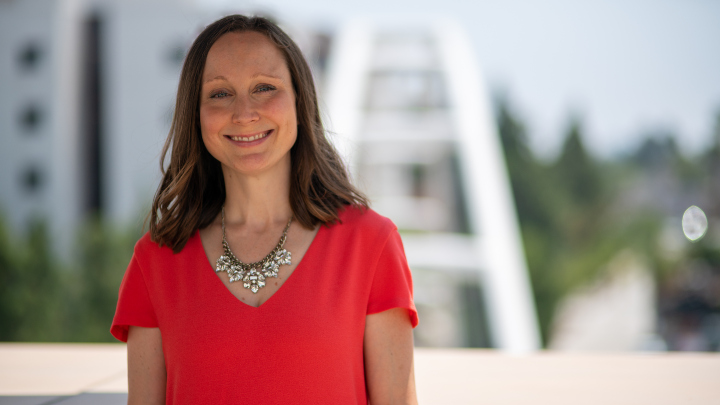Dickson’s research expertise pushes her work into new frontiers

Kelsey Dickson isn't just breaking out of her silo, she's practically taking a wrecking ball to it.
The associate professor in San Diego State University's Department of Child and Family Development has built a successful career as a researcher and practitioner focused on serving youth with behavioral health conditions. Now, she’s leveraging her expertise in implementation science, including implementation methodology, as part of multiple major universitywide transdisciplinary projects on public health crises ranging from water pollution to heat prevention.
"I really love it," Dickson said. "In some ways, it's pushing me a little bit outside my comfort zone, as my training is not within public health. But I really appreciate the way that it allows me to interact with more community members and SDSU faculty and support continued use of these methods at SDSU and beyond."
Outside the silo
Dickson is serving as co-leader of the Intervention Methods group, along with Professor Elva Arredondo (Psychology), at SDSU’s HealthLINK Center — a massive undertaking to address health disparities in San Diego and Imperial Counties. Led by Professor Kristi Wells (Psychology) and Professor Guadalupe X. “Suchi” Ayala (Public Health), the center has garnered more than $40 million in funding from the National Institute on Minority Health and Health Disparities (NIMHD) since 2018, including a $22 million dollar grant secured over the summer that will support the initiative for five more years.
HealthLINK Center projects, led by fellow SDSU faculty, address wide ranging issues such as dangerous sexually-transmitted infections with disproportionate impact on communities of color, sewage contamination in the Tijuana River Valley and adapting an attention-deficit/hyperactivity disorder (ADHD) to be more effective for young students from diverse backgrounds.
She is also representing the College of Education faculty member involved in the CDC-funded SDSU Prevention Research Center, led by School of Public Health Director Eyal Oren and Associate Professor Miguel Zavala (SDSU Imperial Valley). At the center, she’s bringing her expertise to bear as part of a project — previously funded by the SDSU HealthLINK Center — to adapt a public health intervention aimed at heat prevention in urban areas and translate them to the rural setting of the Imperial Valley.
In many ways, Dickson says, this is new territory. However in other ways, she feels right at home.
"The methodologies that I use in my work as an implementation scientist who thinks about how we develop and test interventions for community settings is really relevant for these projects," Dickson explained. "It involves thinking about the methods, partnering with the community and using their expertise and experience to help develop interventions."
Familiar territory
As if that isn’t enough, Dickson is also principal investigator on a new grant funding research on much more familiar turf. In September she received notice of a $5 million grant award from the National Institute of Mental Health (NIMH) to conduct a large-scale test of the effectiveness of an intervention adapted for autistic youth in mental health service settings. The therapy, which was originally developed for classroom settings, showed promise for diagnoses beyond autism in her prior NIMH-funded work conducted at SDSU.
The project is conducted in both San Diego and the Denver area in collaboration with researchers at the University of Colorado School of Medicine and the University of California San Diego. The study will involve 224 providers and 448 children over the course of five years. Providers will receive training on either the test intervention, or a comparative intervention that has already been proven effective.
"What I'm really excited about is that we're able to offer a large number of providers training free of charge in effective interventions," Dickson said. "Everyone gets intervention training, which has the potential to greatly impact children and their families."

